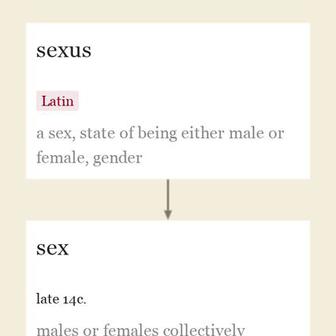sexpot n.
"
Entries linking to sexpot

late 14c., "
Secus seems the more original formation, but it is strange that the older texts only know sexus. The modern meaning of sectiō 'division' suggests that sec/xus might derive from secāre 'to sever', but the morphology remains unclear: does sexus go back to an s-present *sek-s- 'to cut up', or was it derived from a form *sek-s- of the putative s-stem underlying secus? [Michiel de Vaan, "Etymological Dictionary of Latin and the other Italic Languages," Leiden, 2008]
The meaning "
It is curious that the Anglo-Saxon language seems to have had no abstract term for sex, which was expressed only severally as manhood or womanhood. [Thomas Wright, note to "Anglo-Saxon and Old English Vocabularies," 1884]
Also especially the sex "
For the raw sex appeal of the burlesque "shows" there is no defense, either. These "shows" should be under official supervision, at the least, and boys beneath the age of eighteen forbidden, perhaps, to attend their performance, just as we forbid the sale of liquors to minors. [Walter Prichard Eaton, "At the New Theatre and Others: The American Stage, Its Problems and Performances," Boston, 1910]
Sex-life is attested by 1887. Sex-drive is by 1916 (sex-impulse by 1911). Sex-education is by 1894; sex therapist is by 1969, in early use often in reference to Masters and Johnson. Sex-crime is by 1907; sex-maniac by 1895; sex-fiend by 1931 (in a New York Daily News headline).
"
Specifically as a drinking vessel from Middle English. Slang meaning "
Pot roast "
from flesh (n.) + pot (n.1); literally "
Whan we sat by ye Flesh pottes, and had bred ynough to eate. [Coverdale translation, 1535]
updated on July 08, 2022